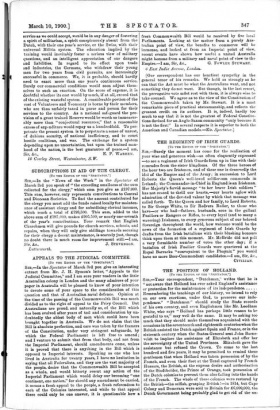APPEALS TO THE JUDICIAL COMMITTEE.
[To THE EDITOR OP THE " SPECTATOR."]
SIR,—In the Spectator of March 3rd you give an interesting extract from Mr. J. H. Symon's letter, "Appeals to the Judicial Committee," and I am sure your readers in the little Australian colony in London and the many admirers of your paper in Australia will be pleased to know of your intention to devote some of your space to the consideration of this question and that of Australian naval defence. Opinion at the time of the passing of the Commonwealth Bill was much divided as to the right of appeal to the Privy Council. But Australians are proud, and naturally so, of the Bill which has been evolved after years of toil and consideration by un- doubtedly the ablest body of men which could have been brought together in Australia. We do not claim that the Bill is absolute perfection, and care was taken by the framers of the Constitution, under very stringent safeguards, by which the Federal Parliament is left free to amend ; and I venture to submit that from that body, and not from the Imperial Parliament, should amendments come, unless it is proved that there is anything in the Bill which is opposed to Imperial interests. Speaking as one who has lived in Australia for twenty years, I have no hesitation in saying that all Federalists, and they are the vast majority of the people, desire that the Commonwealth Bill be accepted as a whole, and would bitterty resent any action of the Imperial Parliament which would delay our becoming "one continent, one nation," for should any amendment be carried, it means a fresh appeal to the people, a fresh referendum to each of the Colonies interested, and while to that appeal there could only be one answer, it is questionable how a fresh Commonwealth Bill would be received by five local Parliaments. Looking at the matter from a purely Aus- tralian point of view, the benefits to commerce will be immense, and looked at from an Imperial point of view, recent events have shown how useful a united Australia might become from a military and naval point of view to the 6 East India Avenue, London.
[Our correspondent has our heartiest sympathy in the general tenor of his remarks. We hold as strongly as he can that the Act mast be what the Australians want, and not something they do not want. Bat though, in the last resort, the prerogative vote mast rest with them, it is always wise to take counsel. We agree as to the view of the Constitution of the Commonwealth taken by Mr. Stewart. It is a most remarkable piece of practical statesmanship, and reflects the greatest credit on its authors. It is, indeed, hardly too much to say that it is not the greatest of Federal Constitu- tions devised for an Anglo-Saxon community "only because it is not the first." In several respects it is superior to both the American and Canadian models.—En. Spectator.]






































 Previous page
Previous page